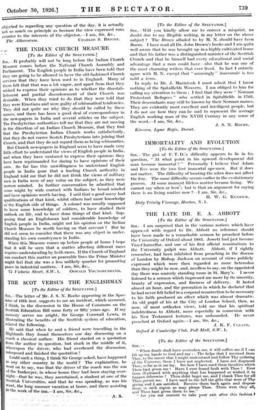THE INDIAN CHURCH MEASURE
[To the Editor of the SPECTATOR.]
Sift,--It probably will not be long before the Indian Church Measure comes before the National Church Assembly and Parliament. The English people in India have been told that they are going to be allowed to have the old-fashioned Church services that they have been used to in England. Many of them felt that that was a bit vague, and apart from that they wished to express their opinions as to whether the disestab- lishment and partial disendoivment of their Church was desirable. When they tried to do that they were told that they were Erastians and were guilty of schismatical tendencies. They did not quite see why they should be called by these names, and there has been a good deal of correspondence in the newspapers in India and several articles on the subject. The Presbyterian authorities tell me that they are not moving in the direction of an Indian Church Measure, that they find that the Presbyterian Indian Church works satisfactorily, that they do not coerce Scotch Presbyterians into joining that Church, and that they do not regard them as being schismatics.
But Church newspapers in England seem to have made very little effort to understand the views of English people in India, and when they have ventured to express their opinions they have been reprimanded for daring to have opinions of their own. So far has this unwillingness to understand English people in India gone that a leading Church authority in England told me that he did not think the views of military men in India were of any value on the subject, as they were narrow minded. In further conversation he admitted that some might by wide contact with Indians be broad minded and have opinions worth having. I said that a good many had qualifications of that kind, whilst others had more knowledge 0C the English side of things. A colonel was usually supposed to have some knowledge of soldiers, to have studied their outlook on life, and to have done things of that kind. Sup- posing that an Englishman had considerable knowledge of English people in India, might not his opinion on the Indian Church Measure be worth having on that acceunt ? But lie did not seem to consider that there was any object in under- standing his own countrymen in India.
When this Measure comes up before people at home I hope that it will be seen that a matter affecting different races requires understanding by both races. If the Church of England can conduct this matter on peaceable lines the Prime Minister might feel that she was a less unlikely quarter for promoting peace in industrial matters.—I am, Sir, &e.,


























































 Previous page
Previous page